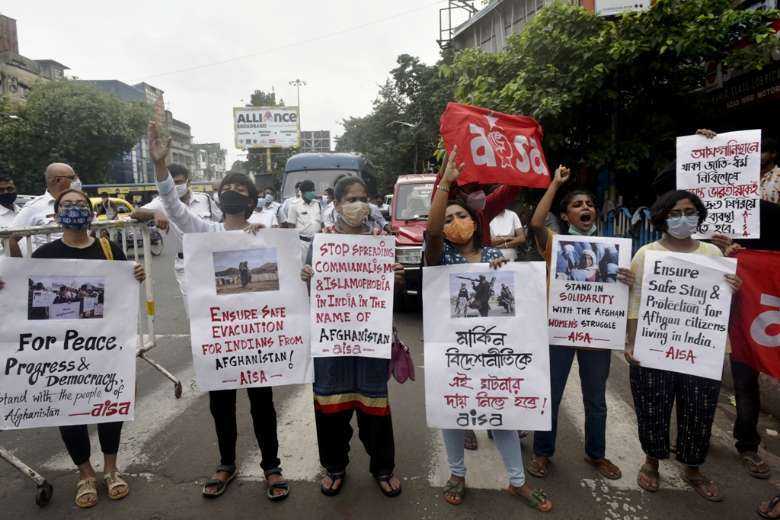
Indian activists voice their concerns over the Taliban's return to power in Afghanistan at a protest in Kolkata, India, on Aug. 18. (Photo: AFP)
Some nations are truly born in tears. For war-ravaged Afghanistan, the tears refuse to stop flowing.
On Aug. 15, the landlocked country in the heart of south-central Asia again fell into the hands of the Taliban after the withdrawal of US troops.
The rise of the radical Islamists has stirred the entire region as it has both short-term and long-term ramifications for Afghanistan's immediate neighbors and extended neighborhoods like India.
On Aug. 19, India’s external affairs minister S. Jaishankar told the United Nations Security Council that Pakistan-based terror groups like Lashkar-e-Toiba and Jaish-e-Mohammed “continue to operate with both impunity and encouragement” either against India or in Afghanistan.
The Taliban are also said to have been assisted and supported by Pakistan.
“Pakistan has sponsored militia as a low-cost strategy to influence events in Afghanistan and bleed India with terror attacks,” says analyst Vidyarthi Kumar, who feels that Pakistan’s complexity vis-a-vis the Taliban has made Hindus hostile to Muslims in India.
Some people are shamelessly supporting the Taliban. These people should be exposed
“The issue is no longer whether Pakistan as a state helped the Taliban. The Taliban extremists have immense acceptability these days among Pakistani civil society,” says G.D. Bakshi, a retired general.
This has serious security implications on India’s northwestern frontiers as well as sociopolitical and cultural consequences for both India and Pakistan.
Some Indian security experts feel that unless Pakistan changes its future roadmap, the country will remain unstable and globally suspect.
In India, while people debate whether their western neighbor may fall by its own weight, there’s also recognition that these are testing times for a multireligious nation where 80 percent of it 1.35 billion people are Hindus. Muslims comprise around 15 percent of India's population while less than 3 percent are Christians. India has a sizable number of Sikhs, Jains and Buddhists.
Some radical Muslim leaders in India have hailed the Taliban for their "victory" against the powerful US and other Western powers, though it is premature to say whether Taliban 2.0 are any different from their extremist version of the 1990s.
Even All India Personal Law Board member Maulana Sajjad Nomani and socialist leader Shafiqur Rahman Burq hailed the return of the Taliban, which should suit India’s ruling Bharatiya Janata Party (BJP).
Yogi Adityanath, the BJP’s chief minister in the poll-bound northern state of Uttar Pradesh, said: “Some people are shamelessly supporting the Taliban. These people should be exposed.”
The rhetoric has just begun and could lead to electoral polarization on religious lines that could suit the BJP well if one goes by past experience.
A Muslim trader in East Delhi said the rise of rabid Islamists in Afghanistan may threaten the social fabric in India. “What’s going on in the Afghanistan-Pakistan region will lead to greater consolidation of Hindu votes.”
Educationist Parul Mukherjee is of the view that this consolidation was already underway ahead of the state assembly elections in Uttar Pradesh and the return of the Taliban had merely put it on a fast track.
Naushad Hussain, a political observer based in northeast India, felt the Afghanistan situation “could create further divisions between Hindus and Muslims in India.” This would essentially mean the further rise of the macho Hindu.
Vidyarthi Kumar believes India’s federal government led by Prime Minister Narendra Modi could revive the controversial Citizenship Amendment Act (CAA), which was put in cold storage following the December 2019 protests.
What will the government do if an Afghan Muslim refugee family crosses over to India?
Many Hindu and Sikh people in Afghanistan would likely seek shelter in India and the CAA was conceived with the idea of granting quicker citizenship to Hindus, Sikhs, Jains, Buddhists and Christians from countries in the immediate neighborhood.
This was quite apparent when Jaishankar tweeted that Hindus and Sikhs in Afghanistan will be top of the priority list for evacuation by Indian authorities.
“What will the government do if an Afghan Muslim refugee family crosses over to India?” Parul Mukherjee asked.
The CAA drew criticism right from the day it was conceived for leaving out Muslims. But as Vidyarthi Kumar pointed out, now all criticism of the government will be taken as an attack on Modi and treated as acts of treason or sedition.
Modi’s detractors say a highly polarized atmosphere prevails in Indian society. Soon after news of Kabul’s fall reached here, social media was abuzz with one message: “Condemning Taliban will be the new patriotism test for Indian Muslims."
There was another vicious thread slamming the portrayal of the Taliban as heroes by some liberals and Muslim clerics.
PM Modi sought to fan these sentiments when he announced that Aug. 14 would henceforth be observed as Partition Horror Remembrance Day.
All this reminds one of Amitava Kumar’s fictional work Husband of a Fanatic, in which both sides — Hindus and Muslims — are shown as keen on rolling back the clock. Why else would Indian people feel the need to revisit the gory partition days of 1947?
Perhaps they are no longer keen on remaining bound together by an artificial thread of unity after India turned 75. The Taliban are merely an excuse.
The views expressed in this article are those of the author and do not necessarily reflect the official editorial position of UCA News.


